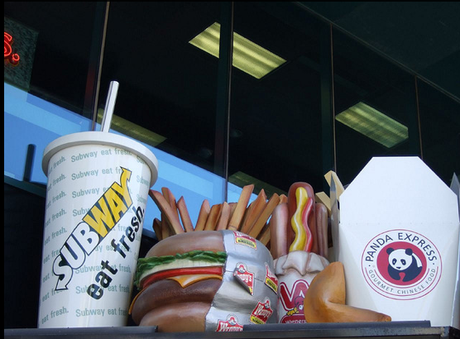But didn’t we know that already?
The quintessential fast-food trio of “burger, fries and Coke” perfectly illustrates the food industry’s ability to capitalize on our most instinctual taste preferences. Unlike, say, a pot of vegetable stew or a bowl of apple slices, the fast-food trio contains all three potent tastes–salt, sugar and fat in combination–endlessly engineered, tested and retested for “hyperpalatability,” making them addictive as well as irresistible.

Flickr Credit: Bowen Murphy. Used under CC license.
Fast-food chicken tenders–even the kind made with “real” chicken breast–are softened, conditioned, injected, salted, sweetened, coated, fried, tested, retested and adjusted to press all the right buttons in your mouth and brain.
As David Kessler explains in The End of Overeating, the foods [...] dished up by the industry are designed, reworked, tweaked and readjusted to deliver the maximum amount of addictive, “hyperpalatable” effect. This processing tends also to increase the number of calories we can take in with a minimal effort, much like the effortlessly drinkable “cupcake in a cup” envisioned in the playfully futuristic movie Wall-E.
PET imaging shows that on the level of neurochemistry, “hyperpalatable” foods have the same effect on human brains as drugs like heroin, opium, and morphine. Tasty, rich food combinations like these were once rare and expensive, if not entirely non-existent, but now they’re cheap, ubiquitous and addictive–and don’t you think for a moment that the food companies don’t know it.
I know I’m not alone in regarding this as an issue of justice, especially when you consider that the majority of government subsidies go toward crops that are raw materials for these hyper-engineered, hyper-addictive foods–which is why, calorie for calorie, potato chips are cheaper than carrots, and soda contains some of the cheapest calories in the whole supermarket. It’s people who are poor who end up paying the highest costs for all this, to say nothing of the expense that diet-related disease presents to the taxpayer.
If that’s not an unjustly earned profit–”swallowing up the needy and making the poor of the land to fail,” as the prophet Amos put it in the KJV–I don’t know what is.
{also see my book Eat With Joy: Redeeming God’s Gift of Food. Parts of this post originally appeared there.}
